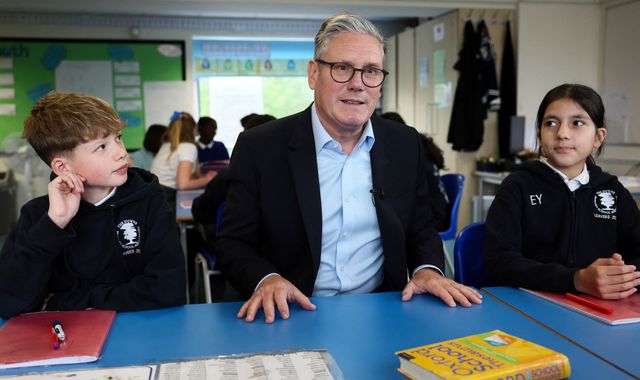
Breaking down barriers to democratic participation, or electioneering that tilts the scales in the government's favour?
Labour have announced plans to extend the vote to 16 and 17-year-olds in time for the next general election.
The Greens, the Lib Dems and the SNP are in favour, but the Conservatives and Reform UK are not.
If you look at the latest polling, and indeed historical polling, you might be able to work out why.
A ballot of more than 22,000 under-18s, carried out prior to the 2024 general election, had the Greens in second place with the Conservatives in fifth.
In the real election, the Conservatives ended up in second place, recording a vote share 15 points higher among the general population than they received among those not old enough to vote.
The Greens, in contrast, ended up in fifth, with a vote share more than 20 points lower than that recorded in the youth poll.
A year is a long time in politics, and Labour have slipped in popularity since that vote, while Reform have surged to a lead in recent polling. But not so among the youngest age group of currently eligible voters.
Labour still lead with 18-24-year-olds, while Reform sit in fifth, according to the latest YouGov poll carried out for Sky News.
Sky News election analyst Professor Will Jennings says there is no reason to expect that voting behaviour among 16 and 17-year-olds will be significantly different to those closest to them in age.
How significant will their votes be at the general election?
This is another question entirely.
Were an election held at the time of the last census, adding 16 and 17-year-olds to the electorate would only have added an extra 2.9% of potential votes. There were fewer 16 and 17-year-olds in the UK than there are people aged 60 or 61, or people aged 86+.
That might still be enough to make an impact in some constituencies, but it's not enough to bring about any huge nationwide swings.
The fact that it's only "potential" votes is significant as well. Young people already turn out to vote at lower rates than older people.
In 2024, people aged 65 or older were twice as likely to vote as someone aged between 18 and 24.
And it doesn't look like 16 and 17-year-olds are about to buck that trend.
A poll of 500 16 and 17-year-olds, carried out by Merlin Strategy this week on behalf of ITV News, found that only 18% said they would definitely vote if there was an election tomorrow, while 49% said they didn't think that they or their peers should be given the chance to vote at all.
What’s happened in other countries?
We don't need to look too far for evidence on this.
In fact, we can stay within the UK - Scotland gave the vote to 16-year-olds at the 2014 independence referendum and extended that for the 2016 and 2021 Scottish parliament elections.
Analysis suggests that it has been successful at boosting electoral engagement in both the immediate and longer-term.
At the 2014 referendum, voters aged 16 and 17 turned out in higher numbers than other young voters, albeit still at lower rates than the population at-large.
And voters who were first eligible to vote at 16 also continued to vote in higher numbers than their slightly older peers in subsequent elections - according to joint research from the Universities of Sheffield and Edinburgh, and political participation think tank d-part.
The Welsh government also extended the vote to 16-year-olds for the 2021 Senedd elections, while the crown dependencies of Jersey, Guernsey and the Isle of Man have allowed 16-year-olds to vote in their assembly elections since before 2010.
Globally, however, there are only seven sovereign nations that currently allow 16-year-olds to vote in national elections. Two are in Europe (Austria and Malta), while the remainder (Brazil, Argentina, Ecuador, Cuba, Nicaragua) are all in Latin America.
The United Arab Emirates has the oldest voting age in the world, at 25, a full four years older than the next set of countries.
The Data and Forensics team is a multi-skilled unit dedicated to providing transparent journalism from Sky News. We gather, analyse and visualise data to tell data-driven stories. We combine traditional reporting skills with advanced analysis of satellite images, social media and other open source information. Through multimedia storytelling we aim to better explain the world while also showing how our journalism is done.

(c) Sky News 2025: Will extending the vote to 16-year-olds benefit Labour at the next general election?


 One child dies after coach crashes in Somerset on way back from school trip
One child dies after coach crashes in Somerset on way back from school trip
 Spies and special forces among more than 100 Britons whose details were included in Afghan data leak
Spies and special forces among more than 100 Britons whose details were included in Afghan data leak
 Sixteen and 17-year-olds will be able to vote in next general election
Sixteen and 17-year-olds will be able to vote in next general election
 England through to semi-finals of Women's Euros after beating Sweden on penalties
England through to semi-finals of Women's Euros after beating Sweden on penalties



